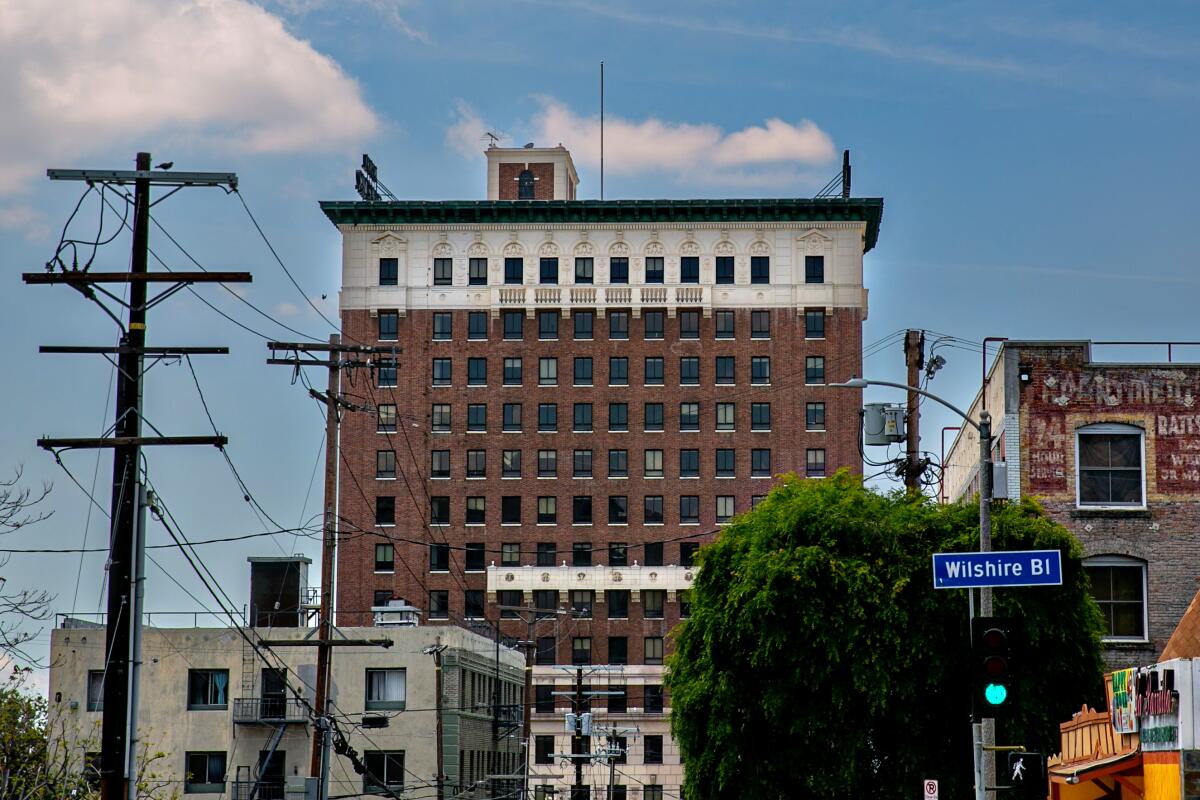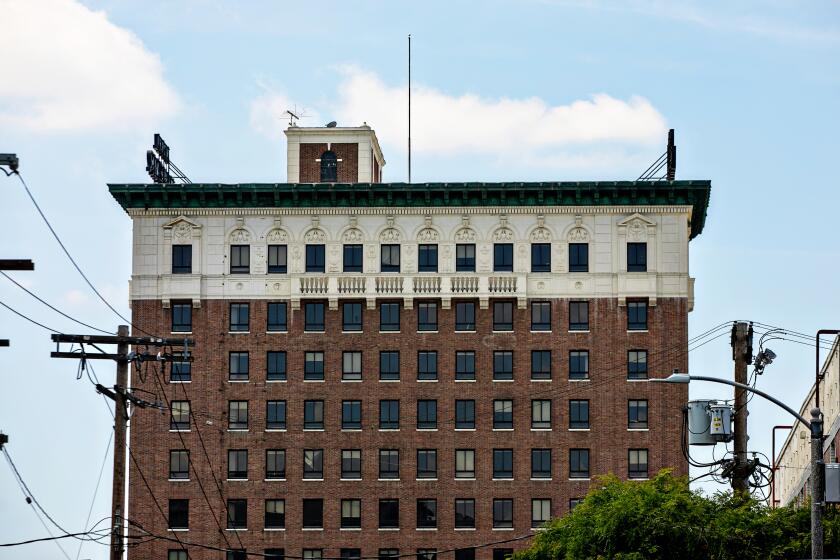Despite concerns, L.A. council votes to buy a hotel for its fight against homelessness

- Share via
The Los Angeles City Council voted Friday to purchase a 294-room boutique hotel and use it as a key asset in Mayor Karen Bass’ fight against homelessness, despite concerns from council members about safety, long-term costs and the plan for running the building.
On a 12-2 vote, the council backed the mayor’s plan to acquire the Mayfair Hotel for $60 million and spend an additional $23 million on renovations and upgrades to the structure, which closed its doors last summer after serving as temporary homeless housing for two years of the pandemic.
Bass said previously that the hotel, located in L.A.’s Westlake neighborhood, will help the city bring down the cost of the Inside Safe program, which currently has about 1,000 unhoused residents living in hotel and motels. By owning the building outright, she said, the city will have the ability to scale back the number of rooms that it rents out each night.
Councilmember Eunisses Hernandez, who represents Westlake, voted in favor of the project, but only after reeling off a list of concerns about how it was pitched to the community, how it will be operated and who it will serve.
Hernandez said Bass’ team showed “a real lack of community engagement” when they proposed the hotel purchase. And she pointed out that the city will, over the next two years, only provide rooms at the Mayfair to residents of Skid Row — not the scores of people who live immediately around the hotel, which is located in a part of the city with a high concentration of working-class, Spanish-speaking immigrants.
“What my community is being told is that the city has over $80 million to spend on purchasing and renovating a hotel in their backyard to provide 300 rooms of interim housing,” she said. “And yet not a single one of those rooms will be available to the people who are living unsheltered just feet away from the entrance.”
The payout, which resolved outstanding damage claims at the Mayfair, won’t be used for repairs at the hotel, even though the city is about to acquire it.
Hernandez said she and the community would have appreciated having Bass appear at a neighborhood meeting to discuss the Mayfair proposal. A few weeks ago, Bass attended a town hall on the Westside devoted to a proposal from Councilmember Katy Yaroslavsky for a 30-bed interim housing facility on Pico Boulevard — a project that would be a fraction of the size of the Mayfair.
Bass did not directly respond to Hernandez’ assertions. Instead, she issued a statement thanking her and several other council members for working with her to “bring people inside and save lives through a citywide approach.”
“Together, with actions like this, we can sustain our momentum toward confronting the homelessness crisis,” she said.
Friday’s vote delivered a policy victory to Bass, who declared a state of emergency on homelessness the day she took office in December. At the same time, her proposal did not receive an especially warm reception. Throughout the deliberations, the proposal drew skeptical and at times biting commentary, even from those who voted for it.
Councilmember Traci Park, who voted yes, said she had “deep concerns about the fiscal prudence and the long term feasibility” of the hotel project. Councilmember Bob Blumenfield, another Mayfair supporter, said the process for considering the purchase had been “very rushed.”
The mayor’s team plans to use a two-year, $60-million state grant to help unhoused residents from Skid Row — many of whom are currently living at the L.A. Grand Hotel in downtown L.A., a facility slated to shut down in January. Those unhoused residents would move into the Mayfair in February and receive access to addiction counselors, mental health specialists and other social services.
That approach has drawn support from a number of community groups, particularly those that serve Skid Row. David Prentice, president and chief executive of the Midnight Mission, told the council he frequently doesn’t have beds for people who live on the sidewalks outside his facility.
“We’re going to advocate for anything to be built to get the unhoused off of the street and into a safe and clean environment,” he said. “It’s human life we’re talking about here.”
The proposal also received praise from Councilmember Kevin de León, whose downtown district includes Skid Row. De León said he was pleased to see Bass take on the effort to “decompress” the homeless population in that area.
Opponents of the project, most of whom live or work near the Mayfair, said the city did a poor job of managing the hotel when it was part of Project Roomkey, which turned L.A. hotels into homeless housing during the pandemic. When the Mayfair participated in that program, the neighborhood experienced an increase in crime, open-air drug use and antisocial behavior, those opponents said.
“It was horrible. It turned the block into a nightmare,” said Nami Oh, who owns a gallery not far away.
The Times reported Wednesday that the city received extensive reports of damage at the Mayfair during Project Roomkey, with participants in the program breaking windows, vandalizing bathrooms and in one case, punching a hole in a wall in the lobby. Hotel workers also responded to overdoses, threatening behavior and violent acts, according to emails obtained by The Times.
Bass said that this time around, the Mayfair will have a much greater level of on-site services, including “housing navigators” — social workers assigned to help unhoused residents find apartments.
Get the lowdown on L.A. politics
Sign up for our L.A. City Hall newsletter to get weekly insights, scoops and analysis.
You may occasionally receive promotional content from the Los Angeles Times.
“This will not be Project Roomkey,” Deputy Mayor Jenna Hornstock said earlier this week.
Despite those assurances, two council members — Monica Rodriguez and Tim McOsker — voted against the purchase. Rodriguez described the transaction as a bad deal, pointing out that the city recently spent $11.5 million to settle claims of damage that occurred at the Mayfair during Project Roomkey. None of that money will go toward repairs.
Rodriguez also said she had not received an adequate explanation for what will happen when the state grant funding for the hotel’s operations runs out.
“I cannot support in good conscience this project, and this acquisition,” she said.
Hernandez, the council member who represents Westlake, won passage of several amendments to the project, securing $400,000 in sanitation services around the hotel and the formation of a community advisory group to monitor the hotel’s operations.
Moments before the vote, she promised her constituents she would hold city officials — including the mayor’s office — accountable for their management of the Mayfair.
“We are not playing,” she added. “I am not playing.”
More to Read
Sign up for Essential California
The most important California stories and recommendations in your inbox every morning.
You may occasionally receive promotional content from the Los Angeles Times.












